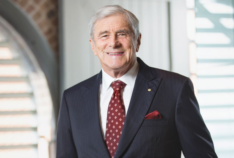Constrained by circumstance – what Seven’s AGM really told us about Australia’s media industry
Seven’s underwhelming AGM is a sign of things to come for most of Australia’s established media players who have no obvious direction to grow in, predicts Mumbrella’s Paul Wallbank.
Thursday’s Seven West Media’s annual general meeting gave us a layer cake of announcements from both proprietor Kerry Stokes and CEO Tim Worner indicating the direction of both the company and the broader industry.
While both Stokes and Worner focused on the media reforms, overpaying for sport and wanting to cut childrens’ TV production, the underlying themes were far bigger changes in both the economy and society which go beyond the media industry.



800m of debt constraint in Seven’s case.
You only have to go back a few years to get a handle on the challenge for media companies. Every year agencies and TV got together and negotiated how they would divvy out the clients money for the year. In exchange for tickets to the AFL, trips to the snow etc a very happy ecosystem grew up simply because TV and other traditional media were the only way to aggregate a large audience.
So here we are – 4 or 5 years on and Facebook and Google have the audience. Because media agencies were caught not doing exactly what the clients trusted them to do the clients went looking for ways to get the audience and more importantly for ways to ensure they had transparency. Facebook and Google provided self service, no commissions and most importantly the audience.
So in my opinion this is not just about media it’s about the agencies as well. The toothpaste is out of the tube.
Not just 4-5 years. The seeds were sown in the mid-80s when first Bob Hawke succumbed to the big end of town’s wishes by creating “aggregation” in regional areas followed by Paul Keating abolishing the “two-station-rule” to again help the major media players at the expense of the small-to-medium. The result has been an ongoing saga of takeovers by outfits with deep pockets (or friendly banks), but without a clue as to what “broadcasting” was all about other than the bottom line. Now we have reached the inevitable point that those big players are discovering that they are, in fact, minnows as far as the rest of the world is concerned, hence Google, Netflix, CBS, etc.
Agree completely. Add to that the additional kickbacks to large agencies from the media that clients have been unaware of. The day will come when all clients will employ in house media professionals with full control and cut out these intermediaries completely.